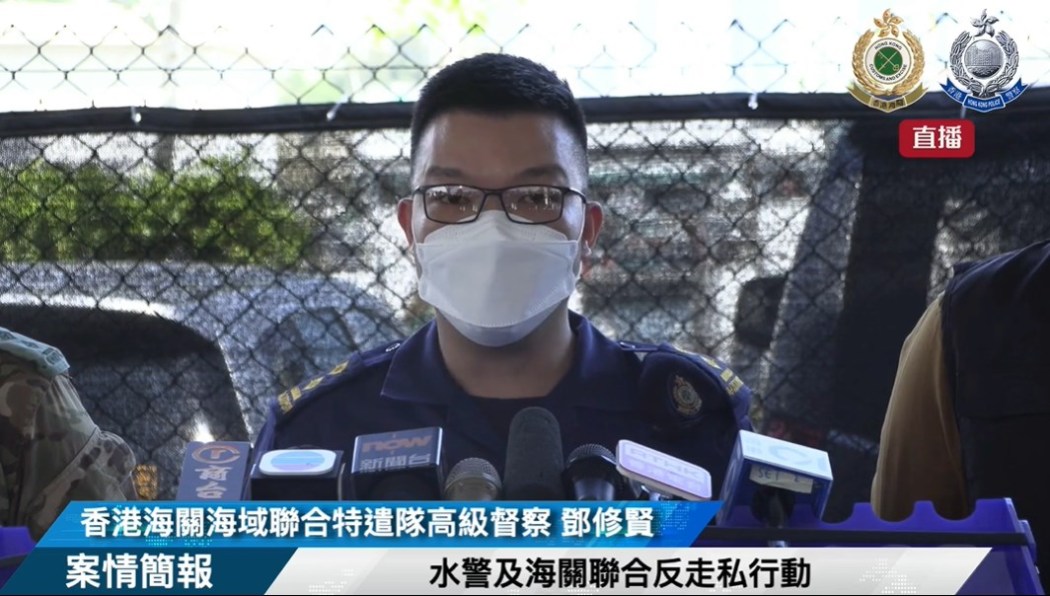Animal rights advocates have expressed shock at a recent smuggling case involving over 130 cats and dogs found on a speedboat in Hong Kong waters.

“It’s horrific,” Sally Andersen, the founder of animal rescue charity Hong Kong Dog Rescue, told HKFP on Friday. “This whole thing exists because people in Hong Kong are buying kittens and puppies online… with no thought about what’s involved.”
Police said on Thursday that marine authorities seized 101 cats and 35 dogs stuffed into cages during an operation late on Wednesday, with as many as 16 cats in one of the cages.
The boat was intercepted following a high-speed chase in the city’s western waters near Tuen Mun. The animals – which were not microchipped – were all young and pedigree breeds.
“They were crammed into 17 cages. Each cage had a different number of dogs and cats, but we could see very clearly that they were [in] a very crowded environment,” Senior Inspector Tang Sau-yin of the customs’ marine enforcement group said during a press conference on Thursday.

Police arrested a 30-year-old man on charges including animal cruelty and importing unrecorded cargo.
‘Not an isolated incident’
The animals are currently being taken care of by the government’s Agriculture, Fisheries and Conservation Department (AFCD) and NGO Society for the Prevention of Cruelty to Animals.
The AFCD has taken in 78 cats, 34 dogs and one rabbit, while the SPCA has taken in 35 cats and 12 dogs.

“It’s not an isolated incident,” Andersen said, adding that Hong Kong was not cracking down hard enough on animal smuggling involving young animals bred in mainland China and brought to Hong Kong.
In January, police found 37 kittens and puppies on a speedboat bound for Hong Kong from Shekou, a port in Shenzhen. In another case last December, 52 cats and dogs were discovered in a van in the coastal New Territories village of Lau Fau Shan.

“It’s just an ongoing frustration that people… think they can buy an animal online as if it’s an inanimate object with no thought about what’s involved,” she said.
Animal activists have long complained that the city’s animal cruelty laws were insufficient for deterring related crimes.
Andersen said she did not know of anybody being prosecuted in relation to smuggling animals into Hong Kong, despite there having been a number of cases uncovered by police in recent years.
After rumours emerged online on Thursday that the animals would be euthanised if they were not adopted after four months, the SPCA clarified that the animals would only be up for adoption after the legal procedures were completed, which would be “no sooner than the minimum quarantine period of four months.”
‘Stop the buying’
Sheila McClelland, the founder of Lifelong Animal Protection, said she and others at the charity were “tremendously glad and tremendously sad” that authorities had intercepted the boat and seized the animals.
“Glad, because these fortunate kittens and puppies will now have a chance at a better life, and sad because so many more remain victims of this terrible trade and of society’s appetite for buying breed animals,” she said.

McClelland said the animals were spared from being tossed overboard to drown, the “tragic end of many smuggled animals” whose journey is interrupted.
In 2020, dead dogs that washed up on beaches in Stanley and Lamma Island were believed to have been animals left to drown in the sea by smugglers fleeing a police chase.
“Many people have been shocked by this incident and have been moved to offer to volunteer, donate or adopt. These are all important, but the most important thing you can do to stop the breeding is stop the buying,” she said.
Support HKFP | Policies & Ethics | Error/typo? | Contact Us | Newsletter | Transparency & Annual Report | Apps
Help safeguard press freedom & keep HKFP free for all readers by supporting our team

LATEST FROM HKFP
HKFP has an impartial stance, transparent funding, and balanced coverage guided by an Ethics Code and Corrections Policy.
Support press freedom & help us surpass 1,000 monthly Patrons: 100% independent, governed by an ethics code & not-for-profit.










